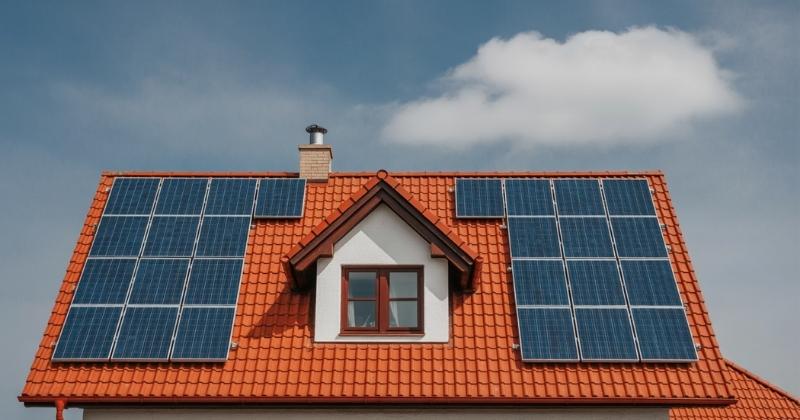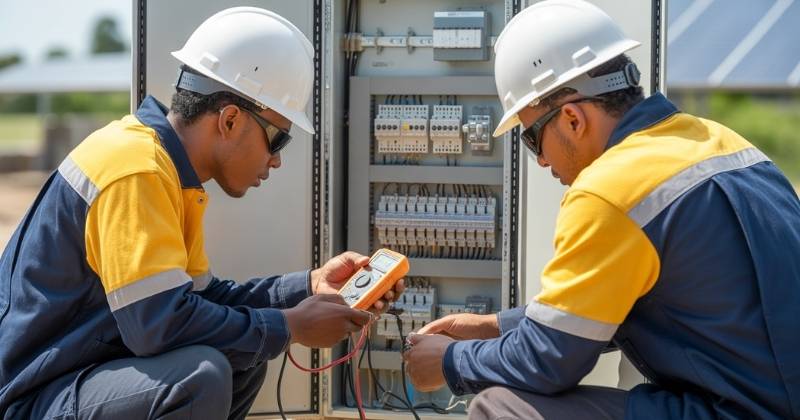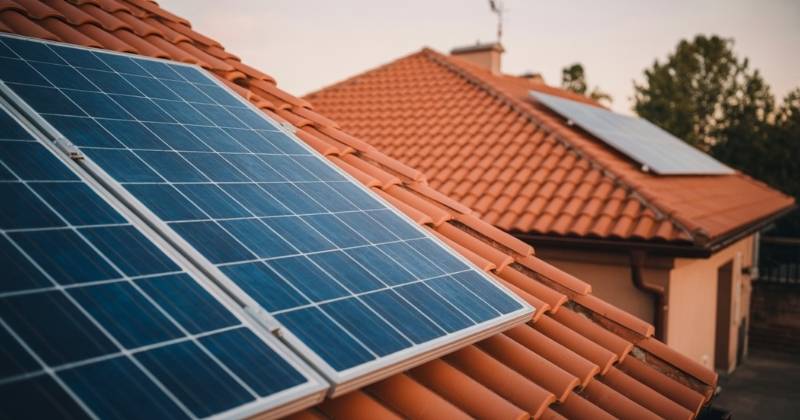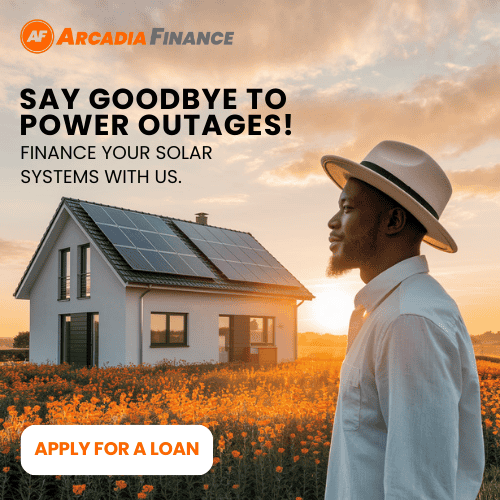
South African homeowners who have invested in rooftop solar have received a significant boost following a major regulatory update by Eskom. The power utility has officially removed the long-standing requirement for residential customers to have their rooftop solar installations signed off by an engineer registered with the Engineering Council of South Africa (ECSA).
Key Takeaways
- Homeowners no longer need costly engineer sign-off: Rooftop solar systems can now be approved by Department of Labour-registered electricians, cutting out expensive engineering certification.
- Registration remains mandatory under NERSA: All grid-connected systems must still be registered to ensure legal and safe connection to the national electricity network.
- Systems up to 50kVA are exempt from registration fees until March 2026: This exemption allows households to save up to R9,000 on connection costs for a typical rooftop solar setup.
About Arcadia Finance
Secure your loan quickly and confidently with Arcadia Finance. Compare offers from 19 trusted lenders, all fully accredited by South Africa’s National Credit Regulator. Enjoy zero application fees and a smooth, transparent process designed around your financial goals.
Simpler Approval and Registration Process
From now on, residential customers only need approval from professionals who are registered with the Department of Labour, specifically Installation Electricians or Master Installation Electricians. The new rules exclude single-phase testers, but they represent a far more accessible route for ordinary households looking to formalise their systems.
This means that while solar users must still register their systems with Eskom, they can now avoid the expensive and often time-consuming step of paying several thousand rands for ECSA-approved engineering certification. Many homeowners had complained that the previous process created unnecessary financial barriers to joining the clean energy transition.
Eskom explained that the updated framework is intended to simplify and accelerate the process for Small-Scale Embedded Generation (SSEG) customers. By cutting the need for costly professional engineering sign-off, the utility hopes to encourage more South Africans to install and register rooftop solar systems safely and legally.
Did you know that South Africa enjoys over 2,500 hours of sunshine each year, making it one of the sunniest countries in the world? That level of solar exposure places it on par with parts of Australia and Southern Spain, making rooftop solar a natural fit for the local climate.
Tip: Homeowners planning to install rooftop solar should ensure that their chosen installer is not only registered with the Department of Labour but also experienced with NRS097 standards. This helps avoid system inefficiencies and ensures smoother Eskom registration.

Compliance Still Required Under National Regulations
Despite these relaxed approval rules, Eskom reminded customers that registration remains mandatory. Households and small businesses must still follow the official process to ensure their solar systems are legally connected to the national grid, as stipulated by the National Energy Regulator of South Africa (NERSA).
Under NERSA’s current regulations, any embedded generation system with a capacity below 100kVA, including residential solar photovoltaic (PV) systems, must be registered with Eskom or the relevant local electricity licensee, even if it does not export energy back into the grid.
However, households that operate entirely off-grid and are not physically connected to Eskom’s network do not need to register, provided they can prove their systems function independently from Eskom’s supply.
Eskom stated that it aims to make the legal connection process as simple, safe, and affordable as possible while maintaining the stability and safety of the national electricity grid. The utility has collaborated closely with industry experts to remain aligned with modern safety standards and to ensure that customers can easily meet compliance obligations.
The National Energy Regulator of South Africa was established in 2005 and is responsible not only for electricity but also for gas and petroleum pipeline regulation. Its role in ensuring fair access and compliance makes it one of the most influential entities in the country’s energy sector.
Encouraging Participation in Clean Energy
Eskom urged all households with rooftop solar systems to register their installations in accordance with NERSA’s requirements. Doing so not only ensures that systems are safe and compliant, but also allows customers to take advantage of future incentives and programmes that reward clean energy generation.
Tip: Registering your solar system might also make your home more valuable. According to property experts, energy-efficient homes often sell faster and command higher prices, as buyers view them as lower-maintenance and future-proofed investments.
Fact: In 2023, over 4,400MW of solar capacity was installed across South Africa, with residential users contributing an estimated 1,000MW. This surge is largely due to persistent load-shedding and the falling cost of photovoltaic panels, which have dropped by more than 80% in the past decade.

Huge Benefit to Solar Users
As the country’s licensed electricity distributor, Eskom holds responsibility for ensuring that all connections to the grid, whether for electricity consumption or generation, adhere to the technical standards, codes, and safety conditions defined by NERSA. This ensures that power from embedded generators, such as rooftop solar systems, does not destabilise the grid or pose electrical hazards.
Before 2019, only medium-voltage customers with systems operating above 1,000 volts were permitted to run embedded generators in parallel with Eskom’s or a municipal licensee’s network. That changed in April 2020 when Eskom extended access to low-voltage customers, including homeowners and small business owners, enabling them to install and operate SSEG systems safely within regulated frameworks.
Since then, in the absence of comprehensive low-voltage regulations, the broader distribution industry has followed the NRS097 standards as a benchmark for safe and compliant solar installations.
Tip: Always keep a copy of your Certificate of Compliance (CoC) and test reports. These documents are vital for insurance claims, especially if your home sustains electrical or fire-related damage. Some insurers now require proof that solar installations meet NRS097 before honouring claims.
Cost Barriers Removed for Residential Users
Previously, Eskom required every rooftop solar system to be signed off by an ECSA-registered professional. This often resulted in substantial extra costs for households, as fees for professional certification varied widely between service providers. In some cases, these costs reached thousands or even tens of thousands of rands, placing a heavy burden on ordinary consumers.
The latest policy shift brings welcome relief. Eskom’s new approach makes the process more cost-effective and inclusive for residential users.
Under the updated rules:
- There are no registration or connection fees for households with solar systems up to 50kVA until March 2026.
- Residential installations can now be approved by Department of Labour-registered professionals (Installation Electricians or Master Installation Electricians), excluding single-phase testers.
- A valid Certificate of Compliance and a basic Embedded Generation Installation (EGI) test report, signed by the registered professional, are required.
According to Eskom, these adjustments can save households over R9,000 in connection costs for a typical 16kVA rooftop solar system.
Fact: The average middle-income South African household consumes around 900 to 1,200 kWh of electricity per month. A 16kVA solar system can typically produce enough energy to offset most of this demand, reducing Eskom reliance by up to 80%.
Continued Benefits and Exemptions
Households with rooftop solar systems of up to 50kVA will remain exempt from both registration and smart-meter installation fees, helping to keep entry costs low for new adopters. For non-residential SSEG customers, connection charges from the previous year will continue to apply, ensuring consistency for small businesses and other entities generating their own power.
Eskom reaffirmed its call for all small-scale energy producers to register their systems promptly. Proper registration not only guarantees safety and legal compliance, but also secures access to any forthcoming government or utility initiatives aimed at supporting renewable energy participation.
Conclusion
Eskom’s latest decision marks a major step forward for ordinary South Africans eager to embrace clean, independent power. By cutting unnecessary engineering red tape and keeping registration fees at zero for small systems, the utility has opened the door for thousands of households to transition affordably to solar energy. The move not only lightens the financial load but also strengthens national energy resilience at a time when grid reliability remains uncertain. With ample sunshine, falling panel costs, and growing government support, rooftop solar is fast becoming one of the smartest long-term investments for South African families seeking stability, savings, and sustainability.
Fast, uncomplicated, and trustworthy loan comparisons
At Arcadia Finance, you can compare loan offers from multiple lenders with no obligation and free of charge. Get a clear overview of your options and choose the best deal for you.
Fill out our form today to easily compare interest rates from 19 banks and find the right loan for you.


